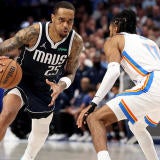No matter how much of a drag the basketball has been in the series, there's still a Game 7 on Sunday between the Toronto Raptors and Miami Heat, and Game 7's are awesome. There's a trip to the Conference Finals on the line and while neither team has much of a chance vs. the (it looks like), that alone is a grand accomplishment.
To get there, though, they have to win a Game 7. Here's a guide for what to watch as the Raptors and Heat square off in Game 7 Sunday.
1. The Fear Factor. The Raptors have already faced a Game 7 in these playoffs, as have the Heat. But those situations are still really tough. So often Game 7's simply come down to whoever has an on shooting night. It's tough to make adjustments so deep in the series and both teams have scouted each other within an inch of their lives.
The Raptors have a chance to go the furthest they ever have in franchise history with a win. They're at home. They're in great position. But Dwyane Wade and company won't be rattled. The Heat will have composure, and the Raptors have to match that. They beat the Pacers who had fewer weapons than the Heat do in that first Game 7 and got the weight off their shoulders by making it out of the first round.
Gregg Popovich talks about what the Spurs refer to as "appropriate fear." The Raptors have to manage to not just be satisfied they made it this far while also playing under control.
2. Numbers game. In advanced statistics there are these things called the "four factors." Dean Oliver, who has done work for ESPN and NBA teams in the past, invented the concept, which says that four stats, 1. effective field goal percentage (which factors 3-pointers), 2. offensive rebound percentage (which is the percentage of available OREBs grabbed), 3. free throw rate, and 4. turnover percentage are the most statistically significant factors in any given game.
The two most important of those are pretty obvious: eFG and offensive rebound percentage. The first is how many shots you make, that's the starting point. The second's a little trickier; it's been found in several studies that what's more important than how many offensive rebounds you collect is how many you surrender. So basically, you don't want to give up a bunch of extra possessions off offensive rebounds to the opponent. Nice case where stats mirror common sense.
Why is this relevant about Miami-Toronto? Because Miami leads in the two most important factors in this series. They have shot better (48.3 percent to 46.3 percent) and given up fewer offensive rebounds to Toronto than the Raptors have given Miami. The Raptors lead in the other two categories, as the Heat have had huge turnover issues and the Raptors are a great team at getting to the line.
However, it's easier for Miami to fix the two factors currently in favor of Toronto than it is the other way around. "Just shoot better" is often something out of a team's control and the Heat have done a great job on the boards, especially without Hassan Whiteside. Meanwhile, the Heat can peel down on their turnovers and commit to defending without fouling much easier.
The four factors aren't the only things that determine a game, but they've been found through research to matter. That Miami leads in those categories is an ominous sign for the Raptors.
3. Dynamic duos. Goran Dragic and Wade are averaging 44.8 points per game in this series, while and DeMar DeRozan are averaging 51.8 points per game, despite both shooting below 39 percent in the series. It's been rough for the Raptors' dynamic duo but they've found ways to put points on the boards which is better than round one.
Wade's been in these situations lots of times. Dragic is a little more unfamiliar despite some experience in Phoenix, while most of this is new for the Toronto duo. The Raptors need just one great game from Lowry or DeRozan. Just one efficient, high-scoring game could tilt the scales. Meanwhile, if the Heat get their offense going, they're going to be in good shape. They've been caught in the mud since Game 2 of the first round, but if they have a breakout game led by Dragic and Wade, it could be an avalanche for Toronto.
4. The fourth quarter has been bad for Toronto. Despite the series being tied, the Raptors have been outscored by 4.7 points per 100 possessions in the fourth quarter by Miami. They've had real problems closing games, and if the game is tight in the fourth on the road, you worry about how Toronto will execute. Both teams have been sloppy in this series, and which team manages to keep its play sharp in those final frames could wind up being the difference.
5. A make-or-miss league. Honestly, one of the hidden secrets about Game 7's is that they're often simply decided by who shoots better. If you reach this point it's a good sign that the two teams are more or less equal. All the adjustments have been found, and in this case, both teams dealt with bad injury luck due to the absence of their centers.
There's stuff to examine in terms of how the Raptors manage to close out on shooters, the impact of 's sore wrist (if he even plays), whether Bismack Biyombo can make a difference inside, and how the smallball lineup with Justise Winslow at center will work. But in the end, this game is going to come down to which team can make more buckets, which have been hard to come by in a rough, ugly series.
Despite the aesthetics, Game 7's are special, and there's a lot on the line as the Raptors and Heat square off Sunday at 3:30 p.m. ET.























